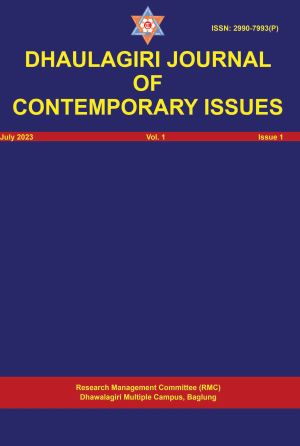Greene’s Quest for Seediness in Journey Without Maps
DOI:
https://doi.org/10.3126/djci.v1i1.58627Keywords:
civilization, primitivism, seediness, West and non-WestAbstract
This paper examines Graham Greene’s travel text, Journey Without Maps (1936/2010), so as to discover why Greene makes a quest for seediness, especially a primitive one. The study is drawn by Greene’s paradoxical fascination to the seediness, which literally suggests the squalor or ugliness. But why does he like it? This is the major concern of the study. Using the concept, primitivism, that was frequently used by the Western travel writers to depict the non-Western peoples and their societies during the colonial era, the study analyzes and interprets the text, and claims that Greene’s journey to the interior of Liberia is the journey of his escape from the contemporary seediness of civilization that he experiences in Britain into the seediness of primitivism that he supposes to find in Liberia where the civilization has comparatively a weaker grip upon human being. After the textual analysis, the study expects to add a new perspective to the critical reading of the Western texts written about the non-Western societies representing them as the primitive and uncivilized others.
Downloads
Downloads
Published
How to Cite
Issue
Section
License
Copyright (c) 2023 Toya Nath Upadhyay

This work is licensed under a Creative Commons Attribution-NonCommercial 4.0 International License.
This license allows others to use, distribute, and build upon your work, as long as they provide attribution to you as the original creator. However, the license restricts commercial use of the work, meaning others cannot use it for commercial purposes without seeking additional permissions or licensing agreements.




